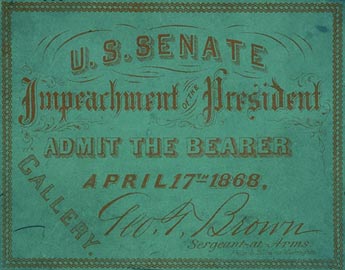Statement on Collecting Objects Regarding the Impeachment of the President
The Smithsonian’s National Museum of American History actively engages with the history, spirit and complexity of the United States’ democratic experiment by collecting, documenting and sharing the American political system, including presidential history.
The museum’s political history curators are following the developments regarding the House of Representatives’ formal impeachment of President Donald J. Trump and the Senate Impeachment Trial starting on Jan. 21. In doing the work of a history museum, curators will determine which objects best represent these historic events for inclusion in the national collection.
The museum’s “The American Presidency: A Glorious Burden” exhibition includes a section on the limits on presidential power, including impeachment. Artifacts related to Presidents Andrew Johnson and Bill Clinton, who were both impeached by the House of Representatives, and acquitted by the Senate, as well as an object related to President Richard Nixon who resigned before the House voted on his impeachment, are on view.
The Smithsonian has been documenting American democratic practices since its inception in 1846 and the roughly 100,000 objects in this museum’s collection reach beyond possessions of elected leaders to touch the broader political life of the nation. The collection focuses on three areas of democracy: Political Campaigns (the voting process and people’s participation); Reform Movements (movements to expand or limit democracy and influence policy); and the Office of the Presidency and First Ladies history. This museum’s collection is home to some of the country’s most revered national treasures, from President Abraham Lincoln’s top hat, which he wore the night he was assassinated, to President Jefferson’s portable desk, which he used to draft the Declaration of Independence, to the First Ladies’ collection, which the Institution has stewarded for more than 100 years.
SI-22-2020

